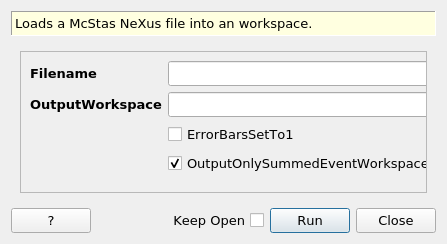\(\renewcommand\AA{\unicode{x212B}}\)
LoadMcStas v1¶

LoadMcStas dialog.¶
Summary¶
Loads a McStas NeXus file into an workspace.
See Also¶
Properties¶
Name |
Direction |
Type |
Default |
Description |
|---|---|---|---|---|
Filename |
Input |
string |
Mandatory |
The name of the Nexus file to load. Allowed extensions: [‘.h5’, ‘.nxs’] |
OutputWorkspace |
Output |
Mandatory |
An output workspace. |
|
ErrorBarsSetTo1 |
Input |
boolean |
False |
When this property is set to false errors are set equal to data values, and when set to true all errors are set equal to one. This property defaults to false |
OutputOnlySummedEventWorkspace |
Input |
boolean |
True |
When true the algorithm only outputs the sum of all event data into one eventworkspace EventData + _ + name of the OutputWorkspace. If false eventworkspaces are also returned for each individual McStas components storing event data |
Description¶
Reads a McStas Nexus file into a Mantid WorkspaceGroup with the name of the algorithm property OutputWorkspace. Data generated by McStas monitor components are stored in workspaces of type Workspace2D and/or EventWorkspace. The name of a workspace equals that of the mcstas component name + ‘_’ + name of the OutputWorkspace. In addition an EventWorkspace with the name ‘EventData’ + ‘_’ + name of the OutputWorkspace is created which contains the sum of all event datasets in the Nexus file. Note if OutputOnlySummedEventWorkspace=True only this EventWorkspace is returned by the algorithm.
For information about how to create McStas outputs that can readily be read by this loader, see here. For more information about McStas, and combined McStas and Mantid analyses see references below.
The ErrorBarsSetTo1 property applies to event data, but not to histogram data.
LoadMcStas replaces LoadMcStasEventNexus. LoadMcStas can be used for reading McStas 2.1 histogram and event data. LoadMcStasNexus v1 can be used for reading McStas 2.0 histogram data.
Information about the required structure of the input Nexus file¶
The input file must have an
/entry1/simulation/name item whose value is "mccode".
The output workspace will contain one workspace for each group of
class NXdata in the input NeXus file, which is not of name "content_nxs"
found in a group of class NXDetector of name "Data".
The name of the workspace is the same as the name of the group,
but with with the name of the outputworkspace, as specified in the algorithm properties,
added to the end.
Description of Data |
Found in Nexus file (within ‘run’) |
Placed in Workspace (Workspace2D) or output |
|---|---|---|
All data |
Group of class |
See below |
Generic group including either event or histrogram data |
each group of class |
one workspace each |
Event data |
item in a [DATA] with a |
event data |
Histrogram data |
items in a [DATA] with a |
histogram data |
Instrument |
|
loaded into workspace, only if events are loaded |
Instrument definition |
|
loaded into workspace, only if events are loaded |
The event data of the McStas file occurs in a NeXus table with six columns:
Weight
X coordinate
Y coordinate
Number of previous events
Detector ID
Time
References¶
For more information about McStas and its general usage for simulating neutron scattering instruments and experiments visit the McStas homepage .
For examples of how combined McStas and Mantid analyses can help instrument simulation and data treatment/analysis tasks see Nielsen., T.R. et al., McStas and Mantid integration, Journal of Neutron Research, vol. 18, no. 2-3, pp. 61-77, 2015 DOI: 10.3233/JNR-160026 [arXiv].
Usage¶
Note
To run these usage examples please first download the usage data, and add these to your path. In Mantid this is done using Manage User Directories.
Example - Load McStas data containing both event and histogram data:
# Load the data into tuple
ws = LoadMcStas('mcstas_event_hist.h5')
# workspace group is first entry in tuple
group = mtd['ws']
print("Number of entries in group: {}".format(group.getNumberOfEntries()))
eventData = mtd['EventData_ws']
print("Number of histograms in event data: {}".format(eventData.getNumberHistograms()))
print("Name of event data: {}".format(eventData.getName()))
someHistogramData = mtd['Edet.dat_ws']
print("Number of histograms in hist data: {}".format(someHistogramData.getNumberHistograms()))
print("Name of hist data: {}".format(someHistogramData.getName()))
Output:
Number of entries in group: 5
Number of histograms in event data: 8192
Name of event data: EventData_ws
Number of histograms in hist data: 1
Name of hist data: Edet.dat_ws
Example - Comparing event data entries in a McStas Nexus file:
The mccode_multiple_scattering.h5 McStas Nexus file contains two event data entries: named single_list_p_x_y_n_id_t and multi_list_p_x_y_n_id_t, one from each of two detector banks of the instrument simulated. Setting OutputOnlySummedEventWorkspace=False these are loaded individually into separate workspaces. In addition, this algorithm returns the workspace EventData_ws, which contains the sum of all event data entries in the McStas Nexus file. The example below performs a test to show that the summation of the workspaces has been executed correctly.
# Load the data into tuple
ws = LoadMcStas('mccode_multiple_scattering.h5', OutputOnlySummedEventWorkspace=False)
# Calculate total of all event data entries
all_scattering_event_ws = mtd['EventData_ws']
total_all = 0
for i in range(all_scattering_event_ws.getNumberHistograms()):
total_all += all_scattering_event_ws.readY(i)[0]
print("The sum of all scattering spectra: {0:.6e}".format(total_all))
# Calculate total scattering from the single event bank
single_scatter_event_ws = mtd['single_list_p_x_y_n_id_t_ws']
total_single = 0
for i in range(single_scatter_event_ws.getNumberHistograms()):
total_single += single_scatter_event_ws.readY(i)[0]
print("The sum of all single scattering spectra: {0:.6e}".format(total_single))
# Calculate total scattering from the 'k02' detector bank
multiple_scatter_event_ws = mtd['multi_list_p_x_y_n_id_t_ws']
total_multiple = 0
for i in range(multiple_scatter_event_ws.getNumberHistograms()):
total_multiple += multiple_scatter_event_ws.readY(i)[0]
print("The sum of all multiple scattering spectra: {0:.6e}".format(total_multiple))
# Check equality
sum_of_scattering = total_multiple + total_single
# This is equal to the sum of all scattering spectra
print("Sum of single and multiple scattering workspaces: {0:.6e}".format(total_single + total_multiple))
Output:
The sum of all scattering spectra: 2.038678e-11
The sum of all single scattering spectra: 1.907862e-11
The sum of all multiple scattering spectra: 1.308161e-12
Sum of single and multiple scattering workspaces: 2.038678e-11
Categories: AlgorithmIndex | DataHandling\Nexus
Source¶
C++ header: LoadMcStas.h
C++ source: LoadMcStas.cpp
